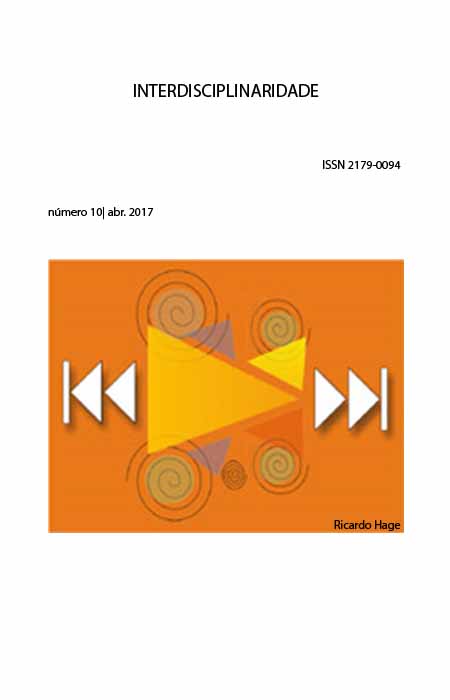AN INTERDISCIPLINARY STUDY ON PLANT/ SOIL SYSTEM THROUGH AN INVESTIGATIVE APPROACH IN TEACHING CHEMISTRY
Keywords:
Interdisciplinary activities. Plant soil system. Natural Sciences.Abstract
the main objective of this work was to involve the students in group work interdisciplinary activities where the teacher´s listening and observation were fundamental at the initial planning of the activities. The students raised hypotheses, planned solutions and experiments that could corroborate with their hypotheses. It was also evaluated the learning acquired by students from the 1st year of a High School class coming from experimental research activities on aspects of the plant soil system which resulted in the development of cognitive skills. Data collection was carried out in three moments: previous questionnaire, experimental research activity (level 1), which addressed material conductivity and experimental investigative activity (level 2) which approached the soil plant system through the development of radish and argula cultivation. The interdisciplinary concepts approached were: solubility, soil composition, chemical species and ions. Also, in order to evaluate the quantitative and qualitative experimental activities associated, categories were created based on the students´ questionnaires and logbooks. Such an attitude provided students with the contextualization of chemical concepts and so, it could be possible to observe the interlacing of the interdisciplinary disciplines in the field of the natural sciences.
References
BRAGA, Benedito. Introdução à engenharia ambiental. São Paulo: Pearson Prentice Hall, 2002.
BRASIL. Parâmetros Curriculares para o Ensino Médio. Brasília, Ministério da Educação,1999.
CARVALHO, A. M. P. et al. Ciências no Ensino Fundamental: o conhecimento físico. São Paulo: Scipione, 2005. 199p.
CASTRO VALDÉS, apud GIL PÉREZ, D. & VALDÉS CASTRO, P. (1996). La orientación de lasprácticas de laboratorio como investigación: unejemplo ilustrativo. Enseñanza de lãs Ciencias, 14(2), 155-163.
DRIVER, R.; ASOKO, H.; LEACH, J.; MORTIMER, E.F. ; SCOTT, P. Construindo conhecimento científico em sala de aula. Química Nova na Escola. São Paulo, n. 9, pp. 31-40, 1999.
FAZENDA, Ivani Catarina Arantes (2003). Interdisciplinaridade: Qual o sentido? São Paulo: Paulus.
FAZENDA, I.C.A.; TAVARES, D.E.; GODOY, H. P. Interdisciplinaridade na pesquisa científica. Campinas, SP: Papirus, 2015. (Coleção Praxis).
FREIRE, P. Pedagogia do oprimido. 43ª ed. Rio de Janeiro: Paz e Terra, 2005.
GIL PÉREZ,D. & VALDÉS CASTRO, P. (1996). La orientación de las prácticas de laboratorio como investigación: um ejemplo ilustrativo. Enseñanza de las Ciencias, 14(2), 155-163, 1996.
FERREIRA, L.H.; HARTWING, D.R.; OLIVEIRA, R.C. Ensino experimental de química: uma abordagem investigativa contextualizada. Química Nova na Escola. São Paulo, vl. 32, n.2, p.101-106, 2010.
HODSON, D. Experimentos na ciência e no ensino de ciência. Educational Philosophyand Theory.Tradução de Paulo A. Porto, 20, pp.53-66, 1988.
HODSON, D. Haciaun enfoque más crítico del trabajo de laboratorio. Enseñanza de las Ciências, v. 12, n.3, p. 299-313, 1994.
LÜDKE, Menga; ANDRÉ; Marli Elisa D. A. de (1986). Pesquisa em educação: abordagens qualitativas. São Paulo: EPU, 1986.
MARCONDES, Maria Eunice Ribeiro. Proposições metodológicas para o ensino de química: oficinas temáticas para a aprendizagem da ciência e o desenvolvimento da cidadania. Uberlândia: Revista extensão V. 7, 2008.
MORTIMER, E.F.; MACHADO, A.H.; ROMANELLI, L.I. A proposta curricular de química do Estado de Minas Gerais: fundamentos e pressupostos. Química Nova, São Paulo, v.23, n.2, pp. 273-283,2000.
MORTIMER, E.F.; MACHADO, A.H. A linguagem numa sala de aula de ciências. Presença Pedagógica, n.11, set/out., pp.49-57, 1996.
MUNFORD, D.; LIMA, M.E.C.C. Ensinar ciências por investigação: em quê estamos de acordo? Ensaio. V.9, n.1, 2007.
SÃO PAULO. Proposta curricular de química (Ensino Médio) – Estudo e ensino. Maria Inês. São Paulo: SEE, 2009.
PELLA, M.O. The laboratory and Science teaching. The Science Teacher 1961, 28, pp.20-31.
POZO, et al. A Solução de problemas. Porto Alegre: Artmed, 1998.
RAVEN, P.H. Biologia vegetal. Ed Guanabara, 2004.
ROCHA, J. C.; ROSA, A. H.; CARDOSO, A. A. Introdução à química ambiental. 2. ed. Porto Alegre: Bookman, 2004. 256p.
SILVA, M. Um estudo de aspectos do sistema solo planta a partir de uma abordagem investigativa no ensino de química. Universidade Federal de São Carlos - UFSCAR, 2012.
TAMIR, P. Practical work at school: An analysis of current practice. In: WOOLNOUGH, B. Practical science. Grã-Bretanha: Open University Press, 1991.
Downloads
Published
How to Cite
Issue
Section
License
Os autores concedem à revista todos os direitos autorais referentes aos trabalhos publicados. Os conceitos emitidos em artigos assinados são de absoluta e exclusiva responsabilidade de seus autores. A Revista Interdisciplinaridade e os textos aqui publicados estão licenciados com uma Licença Creative Commons Attribution-NoDerivatives 4.0 International. Baseado no trabalho disponível em http://revistas.pucsp.br/interdisciplinaridade. Podem estar disponíveis autorizações adicionais às concedidas no âmbito desta licença em http://revistas.pucsp.br/interdisciplinaridade.
A Revista Interdisciplinaridade e os textos aqui publicados estão licenciados com uma Licença Creative Commons Attribution-NoDerivatives 4.0 International. Baseado no trabalho disponível em http://revistas.pucsp.br/interdisciplinaridade. Podem estar disponíveis autorizações adicionais às concedidas no âmbito desta licença em http://revistas.pucsp.br/interdisciplinaridade.


